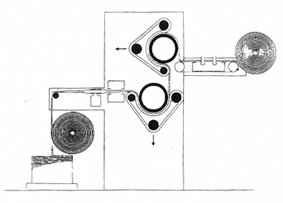|
 This is a compressing, controlled shrinking
process which comprises mechanical compressing of textile material lengthways. In this process needle felts is mainly used. This is a compressing, controlled shrinking
process which comprises mechanical compressing of textile material lengthways. In this process needle felts is mainly used.
NEEDLE FELTS
It is generally known that the shrinking of the fabric to be achieved on the calender machine is dependent on the diameter of the cylinder and on the thickness of the felt. The smaller
the diameter, the greater is the amount of shrinkage in the material. Consequently, the needle felting which Hocks offers is as thick
as technically possible (20 mm and more).In addition, the surface is smooth and level.To avoid damage to the material being finished or the knitted fabric, the felting does not form
any ripples or cracks when it presses the material against the heated cylinder.
The needle felts on offer from Hocks is manufactured from special synthetic fibre mixtures
and it makes setting possible at very high temperatures: it also makes special surface finishing possible.
The main advantages of our compressing felts are a high degree of flexibility and a
surface free from marks and creases.We can offer felting of 100% Polyester, in Polyester/Aramid mixtures as well as of 100% Aramid quality with an especially good
temperature (heat) resistance.Hocks'products are most frequently used on the machinery of the following firms: Albrecht, Arbach, Bitexma, Butterworht, Ferraro, Fongs, Foster,
Heliot, Hunt & Moscop, Kiefer, Kyoto, Lafer, Mather & Platt, Monforts, Monti, Morrison, Muzzi, Tepa, Santex, Sperotto, Tubilar, Tung Sching, Wakayama und Weiss, etc.
Contact us – we’ll be pleased to advise you.
|
|

